All marketers know the stages of the buyer’s journey like the back of their hand. When it comes to Facebook marketing the same rules apply. Read on to learn how to create a Facebook Ads Funnel that will take your audiences on a journey that will end in conversions.
Companies of every size can make use of Facebook’s advanced targeting options to make sure the right content is getting to the right people. You don’t need a massive budget to be successful on Facebook. With advanced customization options, you can create tailored campaigns, connecting with your potential customers at every stage of their journey.
Ad spend on Facebook is increasing every year. As of 2017, Facebook reportedly earned nearly 40 billion dollars in advertising revenue! It’s clear that though Facebook is the place to be, competition can be fierce. Luckily with the right content strategy in place, you’ll be able to transform your leads into sales.

Feel like your posts aren’t getting the engagement they used to? You’re not alone.
Check out our brand new resource called, Protect Your Reach: How to Keep and Grow Your Audience When Social Networks Change the Rules.
You’ll find actionable advice, evidence of reach reduction and a checklist to help you!
No email required! Just click this link and the PDF is yours!
Follow these step to build a Facebook Ads Strategy that works:
1. Identify Your Audience
Identifying your target audience is easier said than done. This process requires a lot of time, energy, and hard work. Your audience targeting strategy will be based on various metrics. To start off on the right foot, segregate and prepare a list of your potential audiences focusing on metrics like interests, age group, gender, occupation, etc. The list will help you to focus on the right kind of audience.
2. Create Content
When we talk about creating a Facebook ads funnel, content development is a very basic and fundamental prerequisite. Facebook is a platform where you can target every type of demography and class of audience. To make your content work you need to ditch the one-size-fits-all strategy and add a personal touch to your marketing.
Always create multiple pieces of content that cater to different audiences. Keep in mind that every audience segment will go about making a purchase differently. Some people may instantly like your product so much that they end up buying it immediately. Others may respond half-heartedly, and take their time thinking it over before they consider buying.
Creating quality content that varies in subject matter will make ensure that you have something to promote for all of your audience segments. You should always switch up your content formats creating blog posts, infographics, videos, and more. Keep your audience in mind during your content brainstorm sessions to make sure they will find it valuable.
3. Promote Content to Warm Audiences
Warm audiences are people who are already interested and invested in your brand. It is advisable to promote your content to these warm audiences, as it will be easier for you to convert them into buyers.
It’s also good to keep an eye on the engagement rates of different pieces of content. Then figure out which content is driving maximum sales for your brand. Take your time to collect and analyze all of your data so you can find the top-performing content for your warm audiences.
For example, Neil Patel collaborated with Ryan Urban of Bounce Exchange for making a video. The video was on “how to build a 225 million dollar business on a dime.” It was viewed by more than 25K people and has more than 800 likes. This is a great example of a content piece that could be repurposed for a lookalike audience.
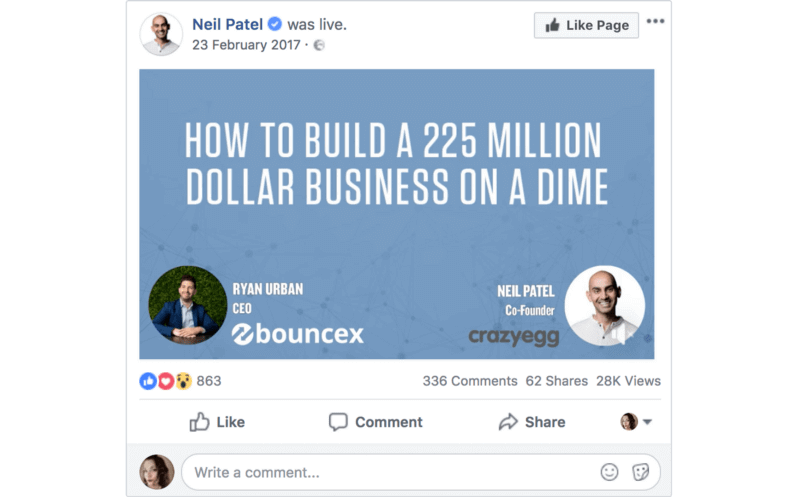
4. Don’t Neglect Lookalike Audiences
Lookalike audiences are users with similar characteristics as your existing or even loyal customers. Facebook has a unique feature which will help you find lookalike audiences. The feature will identify target users with the same sort of interests, habits, and behaviors as your core audiences.
There is a good chance that at least some of the consumers in your lookalike audiences can be converted into buyers. This type of audience will also help you to increase your brand’s awareness reach which gets you more out of your Facebooks ads budget.
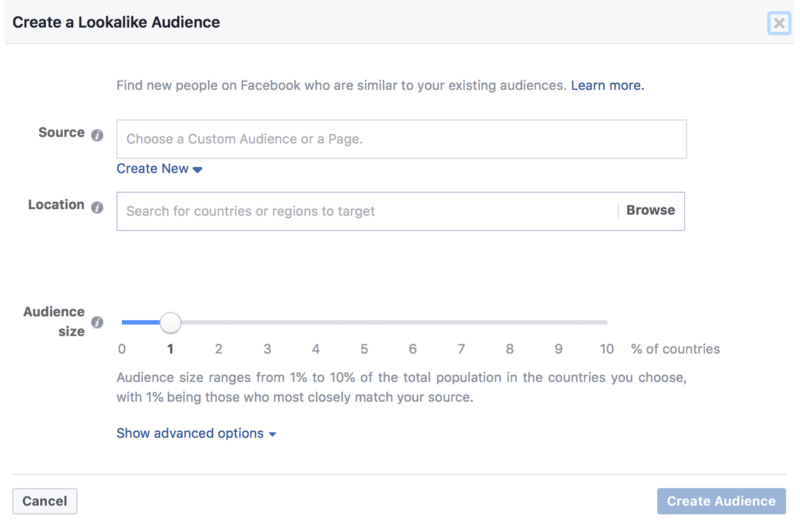
5. Promote Your Best Content to Your Lookalike Audiences
Next, use the content that was most effective with your warm audiences and promote it to your lookalike audiences. It doesn’t matter if the content is a blog post, video, or any other content format. All you need to do is promote it to your lookalike audiences.
If done correctly, you can successfully convert a good number of your lookalike audiences into your core audiences. The fact that they are aware of your brand might even push them to purchase your products.
6. Offer Freebies
Do you think that once you get the attention of the potential buyers, your job is done? You could not be more wrong. It is the responsibility of your brand to maintain the interest of your audiences in your products. This will also help you to gather more information about your audiences.
You can offer your audiences special discounts, free trials, or a valuable gift in return for signing up subscriptions. This tactic will automatically filter your audiences to give you a set of consumers who are genuinely interested in your brand.
Even if you’re an e-commerce shop, don’t just send them to a sales page.
Zafran used Dubai’s Biryani’s festival as a way to promote their restaurant by offering free biryani. The restaurant decided to treat 2 lucky winners with their signature biryani. And all that they asked was for in return was for people to enter their email address if they wanted to participate. The campaign turned out to be a huge success, with the restaurant receiving more than 300 entries.
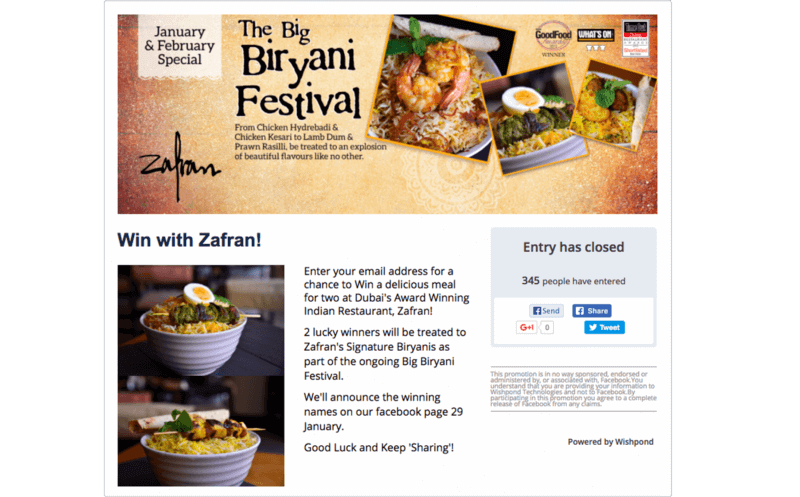
7. Build Trust
Ask for testimonials from your best customers. The more positive testimonials you receive, the the more people will trust your brand. Showcase your positive feedback on your page. Doing so will help you gain the trust of your audiences. Continue building on that trust through consistent and relevant content creation.
For example, Dropbox posted an ad on Facebook, showcasing the number of loyal customers using their service, which acted as social proof. The post showcased that as of 2016, more than 3 billion people were using their cloud-based file storing services. This is exactly the kind of post that can add credibility to a brand.
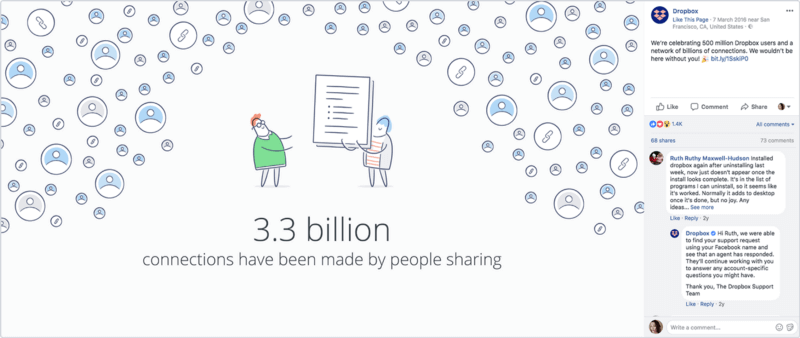
BONUS TIP: Don’t ignore negative feedback, if there is any. Respond to the feedback and use it as an opportunity to keep improving your product and/or service. You can learn more about responding to negative feedback here.
8. Remarket Everything
After implementing all of the steps above, you will have a strong customer base. But it would be foolish of you to think that every customer will automatically become a loyal fan automatically.
But how can you turn customers into repeat buyers who are loyal fans? The answer is easy: through remarketing. You can use remarketing to push your audiences even more deeply into the sales funnel. Remarket your best content in different forms and reposition products that your customers have shown an interest in.
This ad from Amazon is a great example of effective remarketing. The post is a remarketed ad for users who have shown interest in a particular product.
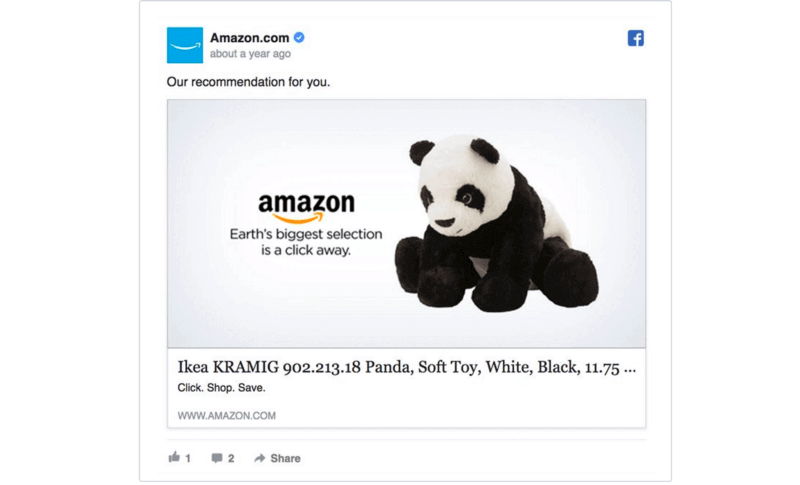
You can further retarget customers who have interacted with these Facebook ads through Instagram ads. This increases the chance of winning them over and recovering abandoned carts. SpearmintLOVE was able to make use of Instagram remarketing to reduce their cost per purchase and increase their return on ad spend.
The brand built a custom audience comprising of people who visited their site within the past 60 days but left without making a purchase. They then displayed Instagram ads showcasing some of their products and urging people to revisit their site. Their Cost per Purchase decreased by 47% and they had a 33.8x return on ad spend.
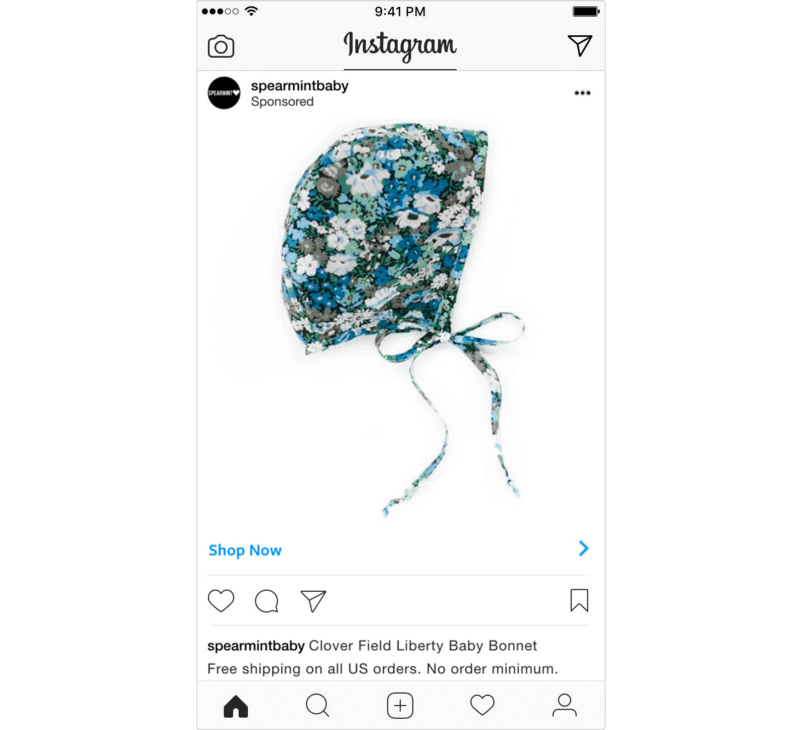
9. Use Facebook Pixels
Facebook Pixels are one of the best tools to track your conversions generated from Facebook ads. The tool is also used for optimizing ads with the help of collected and analyzed data.
The tool is highly beneficial for remarketing to qualified audiences and potential buyers. Brands can also use this tool to generate a new set of audiences for any future Facebook ads. And it’s easy to install!
![]()
10. Use Custom Audiences
Facebook Custom Audiences allows you to create segments with individuals inside to directly advertise to them. This is so powerful.
Imagine knowing a subscriber (not yet a customer) has visited a certain page, highlighting potential interest in buying what you sell.
You can then add them to a custom audience and tailor-make the ad experience and push them over the edge!
With Gist, you can do all of this automatically!
Using our Event Tracking, you can know when your contacts have:
- Visited specific pages
- Clicked elements
- Went to links provided in emails
- And more.
You can then setup an automation to automatically add (and/or remove) those individuals directly to a FB Custom Audience without ever leaving Gist!
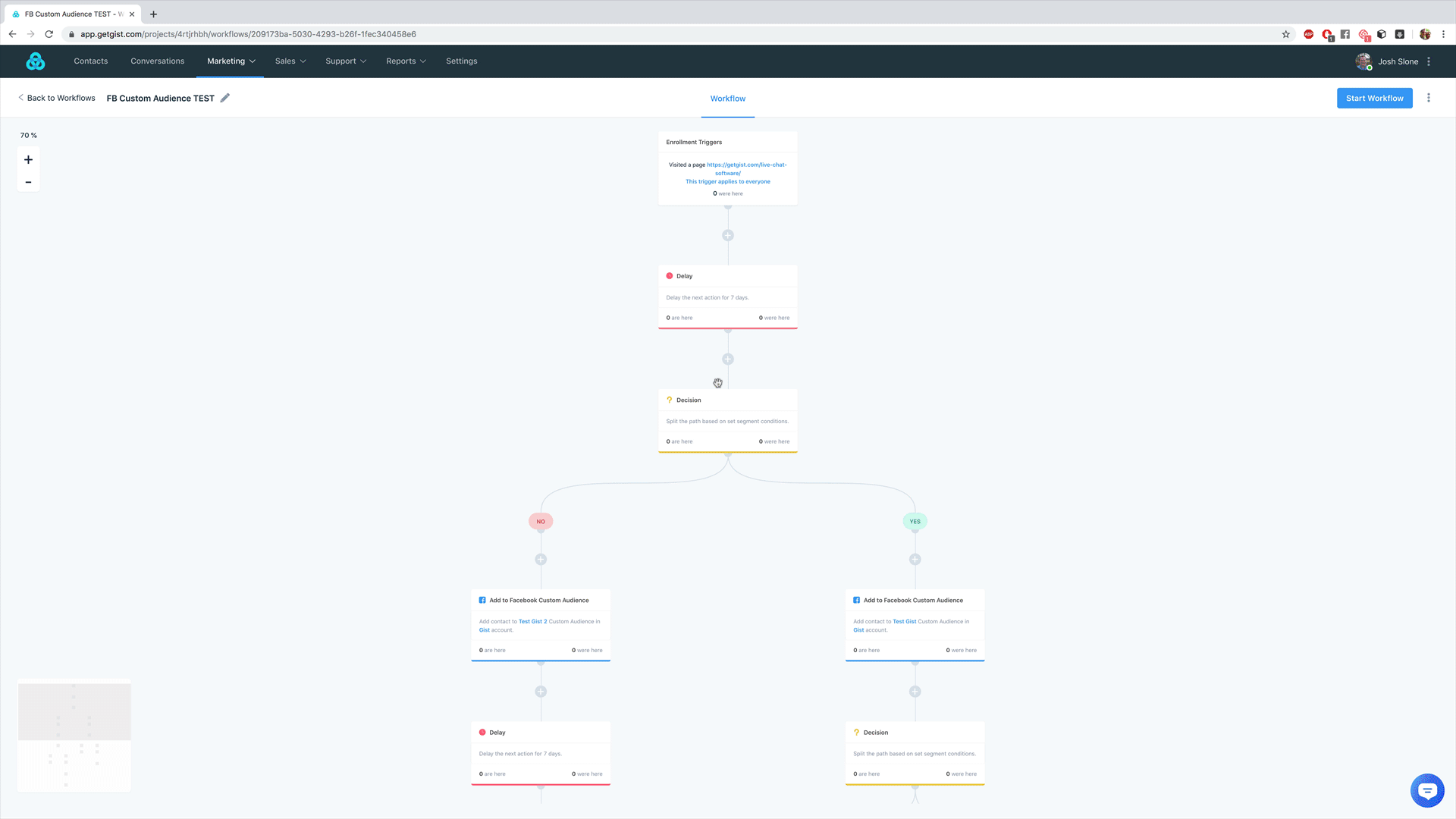
Note: If you’d like to see a longer video showing a complete Workflow setup with FB Custom Audiences, click here.
The Takeaway
Facebook is one of the best platforms to showcase your brand. Don’t forget to design your content for a Facebook ads campaign based on the interests and intentions of your audiences.
Remember that it can be a long, time-consuming process to nurture your audiences to the bottom of the funnel. But on the bright side, once you’re Facebook sales funnel is set up, you can automate the process. You only need to create your content once. After that, you can reuse the material in your remarketing efforts as you see fit.
Now that you understand the process of creating a Facebook ads funnel, try it out for yourself. Implement the funnel into your own social media marketing campaigns and track your progress over time.
Ready to put theory into practice? Start off right by taking advantage of these 5 free social media tools.
Originally published at Socialbakers.com.
About The Author
Shane Barker is the Founder and CEO of Content Solutions and Gifographics. You can connect with him on Twitter, Facebook, LinkedIn, and Instagram.
